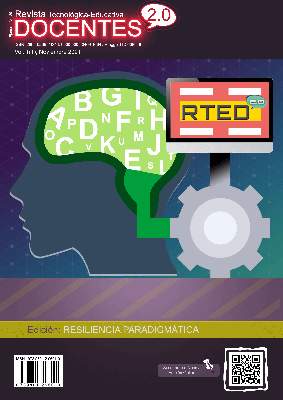Creation of Video Games as an Educational Strategy in Algorithms
 DOI:
https://doi.org/10.37843/rted.v1i1.219
DOI:
https://doi.org/10.37843/rted.v1i1.219
Main Article Content
Abstract
Introducing students to the study of programming basics is not an easy task; it requires time, effort, and a particular focus on how it is learned and taught. Computer programming and especially the basic principles of this area are essential aspects. For this reason, the Autonomous University of Yucatán (UADY) created in the Tizimín Multidisciplinary Unit (UMT) the bachelor’s degree in Software Engineering (LIS), and it began to teach the subject of Algorithmic in the first semester of the career. Included research based on the Scratch programming language was in the Algorithmic issue to support understanding the basic structures studied in it. In this way, the student-organized in workgroups could create a video game to translate their knowledge. The inclusion of Scratch to Algorithm, hand in hand with the project-based learning methodology and the theory of constructionism, allowed the students to develop their video games. The mixed methodological approach was the research approach, and the sample consisted of all the students enrolled in Algorithmic in three semester periods. During this time, 24 video games were generated which met the objectives set, and the results obtained from the entire investigative process have been satisfactory.
Downloads
Metrics
Article Details

This work is licensed under a Creative Commons Attribution-NonCommercial-NoDerivatives 4.0 International License.
Those authors who have publications in our journal accept the following terms:
- When a work is accepted for publication, the author retains rights of reproduction, distribution of his/her article for exploitation in all countries of the world in the format provided by our magazine and any other magnetic medium, optical, and digital.
- Authors will retain their copyright and guarantee the journal the right first to publish their work, which will be simultaneously subject to the Creative Commons Acknowledgment License (Attribution-NonCommercial-NoDerivatives 4.0 International (CC BY-NC-ND 4.0)). That allows third parties to copy and redistribute the material in any medium or format, under the following conditions: Acknowledgment - You must properly acknowledge authorship, provide a link to the license, and indicate if any changes have been made. You may do so in any reasonable way, but not in a way that suggests you have the licensor's endorsement or receive it for your use. NonCommercial - You may not use the material for a commercial purpose. NoDerivatives - If you remix, transform, or build from the material, you cannot broadcast the modified material. There are no additional restrictions - You cannot apply legal terms or technological measures that legally restrict you from doing what the license allows.
- Authors may adopt other non-exclusive license agreements to distribute the published version of the work (e.g., deposit it in an institutional archive or publish it in a monographic volume) provided that the initial publication in this journal is indicated.
- Authors are allowed and recommended to disseminate their work through the Internet (e.g., in institutional telematic archives, repositories, libraries, or their website), producing exciting exchanges and increasing the published work's citations.
- Request of withdrawal an article has to be done in writing by the author to the Editor, becoming effective after a written response from the Editor. For this purpose, the author or authors will send correspondence via e-mail: [email protected].
- The author will not receive financial compensation for the publication of his work.
- All Docentes 2.0 Journal publications are under the Open Journal System (OJS) platform at: https://ojs.docentes20.com/.
References
Alania, R., Diez, C., & Pinglo, J. (2012). Estrategias de enseñanza y estilos de aprendizaje en los alumnos del curso Introducción a la Algoritmia: caso Cibertec. [Tesis de Maestría]. Universidad Andrés Bello, Santiago de Chile, Chile.
Aparicio, O., & Ostos, O. (2018). El Constructivismo y el Construccionismo. Revista Interamericana de Investigación, Educación y Pedagogía, RIIEP, 11(2), 115-120. DOI: https://doi.org/10.15332/s1657-107X.2018.0002.05
AulaPlaneta. (2021). Cómo crear videojuegos en tus clases. https://www.aulaplaneta.com/2021/01/11/recursos-tic/como-crear-videojuegos-en-tus-clases/
Compañ -Rosiqueet, P., Satorre-Cuerda, R., Llorens-Largo, F., & Molina-Carmona, R. (2015). Enseñando a programar: un camino directo para desarrollar el pensamiento computacional. RED. Revista de Educación a Distancia (46). http://www.um.es/ead/red/46 DOI: https://doi.org/10.6018/red/46/11
Guerrero-Castaneda, R., Lenise do Prado, M., & Ojeda-Vargas, M. (2016). Reflexión crítica epistemológica sobre métodos mixtos en investigación de enfermería. Enfermería Universitaria, 13(4). https://www.sciencedirect.com/science/article/pii/S1665706316300422 DOI: https://doi.org/10.1016/j.reu.2016.09.001
Gómez, J., Narváez, L., Rejón, E., & Reyes, J. (2016). Planeación didáctica de Algoritmia. Universidad Autónoma de Yucatán, Mérida, México.
González, J., Cabrera, M., & Gutiérrez, F. (2007). Diseño de videojuegos aplicados a la Educación Especial. Actas del VIII Congreso Internacional de Interacción Persona Ordenador (INTERACCIÓN 2007), (35-44).
López, J. (2011). Programación con Scratch. Eduteka. http://eduteka.icesi.edu.co/pdfdir/AlgoritmosProgramacionCuaderno1.pdf
López-Escribano, C., & Sánchez-Montoya, R. (2012). Scratch y Necesidades Educativas Especiales: Programación para todos. RED. Revista de Educación a Distancia. https://www.redalyc.org/html/547/54724753001/
Monjelat, N., Cenacchi, M., & San Martín, P. (2018). ¿Programación para Todos? Herramientas y Accesibilidad: Un Estudio de Caso. Revista Latinoamericana de Educación Inclusiva, 12(1), 213-227. http://www.rinace.net/rlei/numeros/vol12-num1/art12.pdf DOI: https://doi.org/10.4067/S0718-73782018000100213
Muñoz, R., Barcelos, T., Villarroel, R., & Silveira, I. (2015). Diseño e implementación de un taller de programación de juegos digitales con Scratch como apoyo a Fundamentos de Programación. Anais dos Workshops do IV Congresso Brasileiro de Informática na Educacao (CBIE), (1495-1504). http://dx.doi.org/10.5753/cbie.wcbie.2015.1495 DOI: https://doi.org/10.5753/cbie.wcbie.2015.1495
Narváez, L., & López, R. (2019). Actitudes de los alumnos de la asignatura de algoritmia ante el uso del lenguaje de programación Scratch. Congreso Internacional de Investigación Academia Journals, (2492-2497). Celaya.
Saavedra, E. (2020). Beneficios educativos de la creación de juegos y videojuegos. Vermislab. https://www.vermislab.com/game-makers-beneficios-educativos-de-la-creacion-de-juegos-y-videojuegos/
Stuart, G. (2009). Learning to program from Scratch. 9th IEEE International Conference on Advanced Learning Technologies, ICALT 2009, (451-452). Riga, Latvia. doi:10.1109/ICALT.2009.50 DOI: https://doi.org/10.1109/ICALT.2009.50
Team, MIT Scratch. (2018). Scratch. http://scratch.mit.edu/
Universidad Autónoma de Yucatán (UADY). (2012). Modelo educativo para la formación integral. Universidad Autónoma de Yucatán, Mérida, México.
Vaca, J., Agudo, J., & Sánchez, H. (2014). Evaluación de prácticas de programación mediante rúbricas en Moodle. Actas de las XX JENUI. Oviedo. https://upcommons.upc.edu/bitstream/handle/2099/15458/P107va_eval.pdf
Vargas, C. (2015). La creación de videojuegos en ciencias naturales y la competencia para resolver problemas. Revista Lasallista de Investigación, 12(2). DOI: https://doi.org/10.22507/rli.v12n2a7






